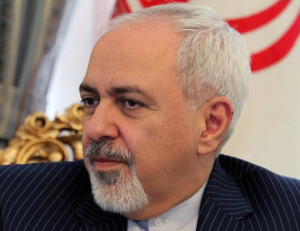October 11-13
What was American moderation two weeks ago suddenly became an American insult last week.
Foreign Minister Moham-mad-Javad Zarif appears to have found himself facing a wall of angry hardliners upon his return from New York.

At least that appears the most likely explanation for his shift from being Mister Moderate while in New York to being Mister Tough Guy upon his return.
In repeated comments in Tehran since his return, Zarif has been giving off entirely different vibes and laying down harsh words for the United States. “He sounds more like Mahmud Ahmadi-nejad than Mohammad-Javad Zarif,” one Tehrani commented.
One example of the tough guy approach has been Zarif’s demand that the Big Six come up with an entirely new proposal before the October 15-16 talks in Geneva. (See accompanying story at left.)
But an even more dramatic shift has come in Zarif’s about-face when reacting to President Obama’s words.
Obama’s speech to the UN September 24 welcomed President Rohani’s overtures but outlined the same carrot and stick approach that Obama has used for years. There was nothing new. Obama even went so far as to say, “The United States of America is prepared to use all elements of our power, including military force, to secure our core interests in the region.”
But Zarif characterized the speech as a dramatic improvement and a sign of a new American willingness to talk with Iran. His deputy, Morteza Sarmadi, said the UN speech was very respectful and used a softer tone than in the past.
Tehran newspapers similarly spoke of the “shift in tone” in the UN speech. Even the hardline daily Jomhuri Eslami said it was impressed, citing Obama’s statement—a repeat of previous statements that were ignored in Iran—that he does not “seek regime change in Iran.”
The next week Zarif returned to Iran and Obama returned to Washington, where he met in the White House with Israeli Prime Minister Binyamin Netanyahu. Afterward Obama met with reporters and said, among other things, “I’ve said before and I will repeat that we take no options off the table, including military options, in terms of making sure that we do not have nuclear weapons in Iran.” It was similar to what he told the UN—and similar to what he has said for almost five years as president.
Zarif then went into orbit. And he went into orbit in English, not just Farsi.
In an interview with CNN, he said Obama’s “no-options-off-the-table” comment was “insulting to the Iranian people.” Zarif acted as if this comment was something new. “You do not deal with another state with mutual respect by threatening them, by trying to intimidate them. The Iranian people react very, very negatively to such languages of threat and intimidation,” he told CNN’s Fareed Zakaria. The interview was broadcast Sunday, October 6.
PressTV, state broad-casting’s English language outlet, also was shocked, shocked at the Obama remarks, which it found to be at odds with the changed relationship.
Majlis Deputy Mohammad-Ali Esfahani said that Obama’s shift from rapprochement to warmongering “proves that the Americans cannot be trusted.”
Foreign Ministry spokeswoman Marzieh Afkham objected also to the military option remark, saying, “We expect the US government to deal with Iran based on a realistic policy and talk to the great Iranian people with respect.”
Meanwhile, Zarif cited a recent US poll that he said showed 75 percent of the American people believe “the nuclear issues with Iran will end with a negotiated solution.” He said that showed a huge change in recent months.
Actually the poll showed that 75 percent of the US public supported talks with Iran and the pollster said that was in line with previous polls that had asked the same question, indicating no change.























